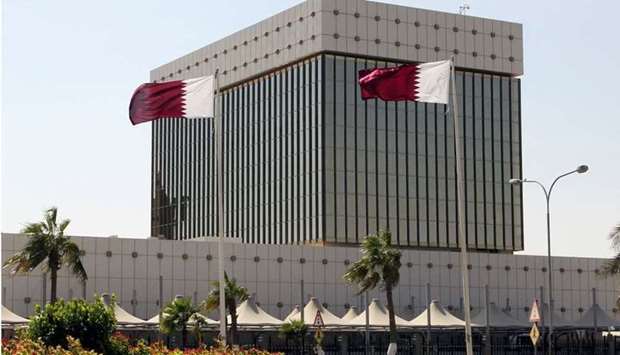The Qatar Central Bank (QCB) is in the process of issuing information security controls that will be applicable to all the fintech segments, following the launch of the National Information Security Standards Framework by the Ministry of Transport and Communications in 2019.
Given the gravity of cyber risks to financial institutions and the overall financial system, the development of a mandatory comprehensive cyber security framework would be vital for Qatar as a fintech hub, said a joint report of the Qatar Financial Centre Authority and Refinitiv.
During 2019, Qatar’s banks came under a barrage of cyber-attacks in the form of phishing attempts and targeted social engineering attacks on the banking sector increased by 50% between the first quarter and the fourth quarter of 2019, making up over 50% of overall cyber-attacks during the year, according to the Qatar Central Bank 2019 financial stability report.
As a result, the QCB developed practices and response mechanisms to tackle cyber-attacks on the financial sector to enhance financial institutions’ cyber security capabilities.
The QCB also established a dedicated Information Security Department (ISD) in 2019, which is responsible for guiding financial institutions towards improving information security and maintaining a high level of cyber resilience.
This function focuses on developing six fundamental elements of cyber-security programme such as governance, threat intelligence, security operations, security architecture, risk management and cyber security capabilities development.
Qatar has set its sights on attracting Islamic fintech, regtech, insurtech and small and medium enterprises-enabling fintech, which encompass a range of fintech business models such as digital banks, alternative lending platforms, robo-advisors and product aggregators.
With the potential offering of these new types of financial services in Qatar, the market would benefit from the QCB making amendments to existing regulations or issue new frameworks to ensure these new activities do not compromise the stability and soundness of the financial system.
The Qatar Fintech Hub (QFTH) has established strategic relationships with the various fintech hubs worldwide. Qatar would also benefit from its financial regulators establishing fintech bridges, or memoranda of understanding with fintech regulatory authorities to facilitate information sharing on regulatory best practices and providing regulatory support for Qatar-based fintechs seeking to extend their operations abroad.
In the international arena, the Global Financial Innovation Network (GFIN) is a network comprising over 60 fintech stakeholders, led by a group of financial regulators from various jurisdictions.
The QFC represents Qatari regulators as a member of this network, while the Qatar Development Bank participates as an observer.
The GFIN seeks to provide a more efficient way for innovative firms to interact with regulators, through a “global sandbox”. Fintechs can apply to this scheme to test innovative products, services, or business models across more than one jurisdiction.
The GFIN also aims to create a new framework for cooperation between financial services regulators on innovation-related topics, sharing different experiences and approaches.
Given the gravity of cyber risks to financial institutions and the overall financial system, the development of a mandatory comprehensive cyber security framework would be vital for Qatar as a fintech hub, said a joint report of the Qatar Financial Centre Authority and Refinitiv.
During 2019, Qatar’s banks came under a barrage of cyber-attacks in the form of phishing attempts and targeted social engineering attacks on the banking sector increased by 50% between the first quarter and the fourth quarter of 2019, making up over 50% of overall cyber-attacks during the year, according to the Qatar Central Bank 2019 financial stability report.
As a result, the QCB developed practices and response mechanisms to tackle cyber-attacks on the financial sector to enhance financial institutions’ cyber security capabilities.
The QCB also established a dedicated Information Security Department (ISD) in 2019, which is responsible for guiding financial institutions towards improving information security and maintaining a high level of cyber resilience.
This function focuses on developing six fundamental elements of cyber-security programme such as governance, threat intelligence, security operations, security architecture, risk management and cyber security capabilities development.
Qatar has set its sights on attracting Islamic fintech, regtech, insurtech and small and medium enterprises-enabling fintech, which encompass a range of fintech business models such as digital banks, alternative lending platforms, robo-advisors and product aggregators.
With the potential offering of these new types of financial services in Qatar, the market would benefit from the QCB making amendments to existing regulations or issue new frameworks to ensure these new activities do not compromise the stability and soundness of the financial system.
The Qatar Fintech Hub (QFTH) has established strategic relationships with the various fintech hubs worldwide. Qatar would also benefit from its financial regulators establishing fintech bridges, or memoranda of understanding with fintech regulatory authorities to facilitate information sharing on regulatory best practices and providing regulatory support for Qatar-based fintechs seeking to extend their operations abroad.
In the international arena, the Global Financial Innovation Network (GFIN) is a network comprising over 60 fintech stakeholders, led by a group of financial regulators from various jurisdictions.
The QFC represents Qatari regulators as a member of this network, while the Qatar Development Bank participates as an observer.
The GFIN seeks to provide a more efficient way for innovative firms to interact with regulators, through a “global sandbox”. Fintechs can apply to this scheme to test innovative products, services, or business models across more than one jurisdiction.
The GFIN also aims to create a new framework for cooperation between financial services regulators on innovation-related topics, sharing different experiences and approaches.


